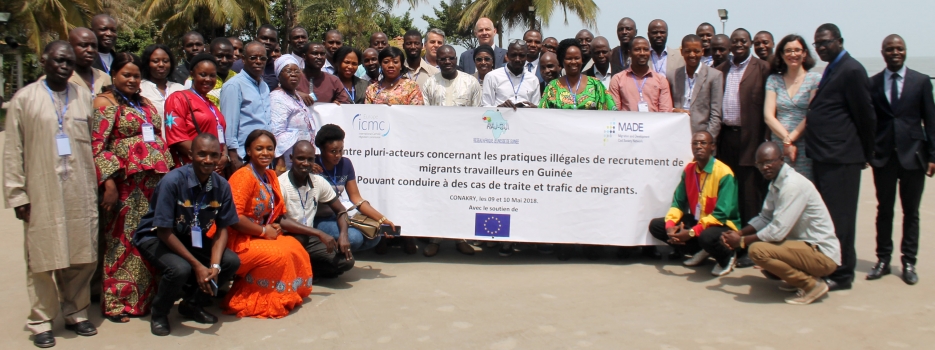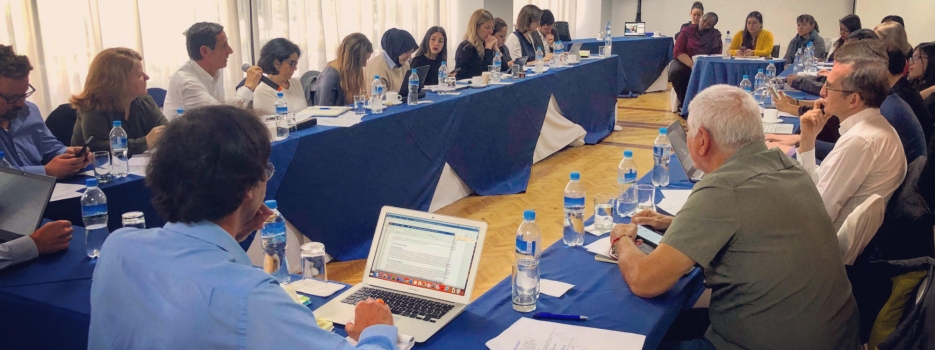30 November 2018
Giving voice to the voiceless: Meet Hamza, Youth Representative, and Co- Chair of the 2018 GFMD Civil Society Days!

Hi Hamza. Welcome to the 2018 GFDM Civil Society Days! Are you excited and happy to participate?
Yes, I am thrilled to co-chair the event even because not only is this the first time that the GFMD will have three chairs (one chair and two co-chair) but also, I will be the first Youth co-chair Representative at the GFMD. I have advocated for civil rights since I arrived in Sweden and I am full of energy and expectations for GFMD and for the adoption of the Global Compact!
Not only are you co-chairing at the GFMD, but also, during the Migration week, you are going to representing the Youth Forum. What is your role going to be and how you will link the two events?
I have a leadership role in the Youth Forum during the Migration Week. Through the child initiative program we want to amplify youth voices.
I am part of the liaison committee of the European team, together with other five regions. We received more than 700 applications, from which we selected almost 300 youth delegates. Our objective is to engage the youth in the Global Compact discussion. Civil society, governments and institutions have to listen to us because we are the future and their decisions will impact our lives. During the Migration Week I will act as a trait d'union between the Civil Society Days and the Youth Forum and I will bridge these two event discussions.
Can you tell us about your personal background and why you have started at such a young age to advocate for civil rights and children rights?
My background, my personal story definitely played a huge role in my human rights career.
I was born in Somalia, Mogadishu. I arrived in Sweden in 2010 by myself, when I was only 16 years old. My family is still living in Somalia, a fragile state that has emerged from a two decades-long civil war that caused significant damage to the country’s economic and social infrastructures. Postwar conditions in my country continue to be very difficult with widespread poverty and weak institutional capacity. In the last years we also faced drought and famine which drive the country into even greater poverty.
The Somali civil war, leaving my country and my family, and traveling all alone from Somalia to Sweden have been really traumatic experiences for me but have pushed me to advocate for migrant rights.
Once you arrived in Sweden what happened?
As soon as I arrived in Sweden as unaccompanied minor I applied for the asylum status. The process lasted almost seven months. Once I received the asylum status, I attended high school in Sweden and am currently studying for a bachelor of political science degree at Lund University.In 2013 I started working for the Swedish Unaccompanied minors’ Federation (Ensamkommande förbund) and from 2014- 2106 I served as the president of the organization. ‘The association's main aim is to give voice to the unaccompanied minors and to lobby for a dignified treatment during the asylum process as well as to create supportive environment for the youth to thrive in their new society.’
My work as the president of the federation was to bring my experience and my background and advocate for unaccompanied minors who are coming to Sweden.
I have raised the voices of young refugees (who have, like me, a direct experience on migration) in different discussions with governments and highlight which struggles unaccompanied minors are facing during the asylum process. When I started working for the Swedish association of unaccompanied minors the organization was very small, but over the years the organization has grown significantly. ‘I am proud to have been part of this growing organization which today boasts 3000 members nationally. This is probably one of my best achievement as the president since I worked intensively with member recruitment and marketing’.
Together we brought the government institutions close to us with the aim that they don’t simply talk about us, but also with us. For example, we started an initiative with the Sweden Advisory Council for Migration where youth migrants are sitting together with the migration officials. We bring our child rights perspective and experience on what needs to be changed in the asylum process. To give you an idea, when I arrived in Sweden, children and adults were going through the same asylum process. There was no difference. Now things are changing and children have better state support and they are going through a different asylum process.
The organization also has a social network role. We are fighting the racist and anti-migrant narrative, hoping to humanize migration and especially youth migration. We want our voices to be heard.
This year you also represented the Swedish Youth Delegation in the third committee of the United Nations General Assembly. How was the experience?
Yes, I represented Sweden along with other Youth Delegates from around the world. I delivered a speech on the behalf of Sweden, about the importance of adoption and implementation of the Global Compact by bringing the perspective of child rights and child detention. For me this was a great and unexpected opportunity and experience. I was selected from 83 members organizations, and during my speech I felt that I made an impact because people were listening to me and many came to congratulate me for having raised very important issues.
What do you think you will bring to and learn from the 2018 GFMD?
‘Since the last GFMD in 2017 many things have changed in the worldwide political context. We are experiencing one of the worst refugee crises in the world since second world war and the majority of the victims are youth. At the same time, austerity, anti-refugee/migrants sentiments and racism are growing in the many countries, which makes the need for advocacy and giving voice to the voiceless even more important. There is a need to build bridges between the receiving societies and the asylum seekers, and I feel that I have the right experience, capacity and attitude to bring that message to GFMD’.
During the event I’ll listen to different people and organizations that are working with migrants and migration issues. I will learn from them and take their recommendations for the Global Compact Conference. Perhaps I am too hopeful about the whole thing, but having people come together to discuss migration and refugee issues is too good an opportunity to miss!




